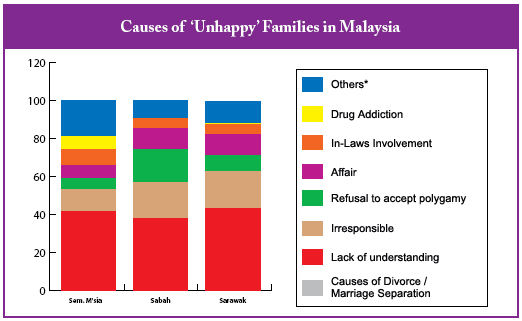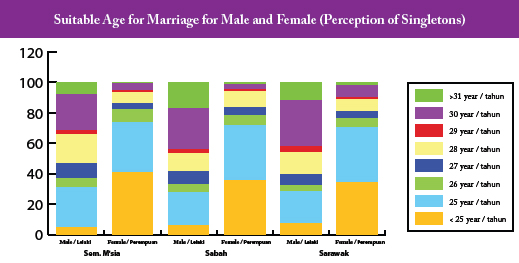“Home is where the Heart is” as the saying goes. And at the core of this ‘loving’ heart, lies the family, an ever-evolving institution that shapes how we, as children, will turn out to be, and how we, as parents will eventually mould our own families.
That the ‘family’ in Malaysia has evolved is not a doubt. The ‘family’, after all, is an organic entity that can be influenced by many factors. Urbanisation, greater mobility, an unprecedented exposure to the rest of the world thanks to the internet, economic challenges, and materialism, along with the rise of the middle class and the emancipation of women in the country, are all factors that determine its state of health. And since the family collectively lays the bricks of society’s foundation, it consequentially plays the integral role of determining the health of society as well.
The State of Malaysia’s Family
So what is the state of Malaysia’s family in this context? Judging from the social issues ranging from drug addiction to divorce and child abuse culminating in a call to the government to implement programmes promoting social values in the country, the health of the Malaysian family does not look at its optimum best.

One of the first respondents to the programme is the Ministry of Women, Family and Community Development. Its newly appointed minister, Datuk Dr Ng Yen Yen is cautioning young people against getting married in a rush. “Nowadays, a lot of people are jumping into marriage when they are still too young,” she said in The Star recently, alluding to teen pregnancies being the grounds for the rash move. It is a contributive factor to why there are about 126,810 single mothers (Population and Housing Census 2000 done by the Department of Statistics) in the country today.

The growing number of divorces has also brought on its own negative by-products, in the form of further degeneration of the broken family like domestic disputes and complications arising out of child custody and maintenance. The ‘solution’ on the horizon is the imminent enforcement of the new Islamic Family Law (Federal Territories) (amendment) Bill, to help define and protect the rights of parents and their children for Muslims, and also to offer guidelines for non- Muslims involved in domestic disputes.
Calls to the public and amendments to the laws are some ways to cure the symptoms of society’s ills. But the problem begins at the root, which is the ‘family’, and that goes back to You, the parents to recognise the role you play in influencing your family’s “happiness” and determining how you wish to put in place, those ‘bricks’ of society.
How does one achieve a “happy” family?
“Commitment, positive and continuous communication, spending time, love, working together, having direction and creating goals for your family” are some of the ways, as conveyed by Dr Anjli Doshi Gandhi, Deputy Director General (Policy), National Population and Family Development Board Malaysia. “Everyone must work together, nurture strong emotional bonding, family resilience, coping skills, and of course, be financially stable.”
A tough call for today’s parents indeed, especially for young couples struggling to juggle career and parenthood. To lend a helping hand, the National Population and Family Development Board (LPPKN) launched their Family First – Bring Your Heart Home Programme in 2003. The Smart Start Package* and Smart Start Premarriage Program has been developed and implemented as a way to help newly-weds prepare for marriage and deal with the issues they will face. In addition to this, LPPKN has also implemented the Parenting@Work Program which is aimed at guiding dual-income parents and those with young children and teens deal with their daily challenges as well as balance the demands of work and family life. Guidance on how to make marriage and parenting work comes in the form of seminars, workshops, activities and counselling.
Very pertinent to the issue, which reiterates the words of Datuk Dr Ng Yen Yen, is the fact that young couples often jump into a marriage clueless. In the year 2006 alone, a staggering 178,506 couples got married according to the Statistics on Women, Family and Social Welfare 2007 published by the Ministry of Women, Family and Community Development. One wonders, how many of these couples are still married today or are facing marital problems?
Emotional Health of the Family
Consultant Psychiatrist Dr Yen Teck Hoe, Vice-President of the Malaysian Mental Health Association agrees that, “A lot of people don’t understand what it means to be a spouse.”
He illustrates the point by saying that people who get married, frequently still want to continue in their old ways when they were single, and do not realise that the family structure and its dynamics, which had the support of the extended family comprising grandparents, aunties and uncles have changed to the nucleus family with only father, mother and child of today. “This type of family lacks the support which easily leads to broken homes, child abuse, spouse abuse and sexual abuse.”
Learning Parenting Skills
Dr Yen endorses going for a course before getting married, not just to realise their changing roles and responsibilities but also to learn parenting skills which are part and parcel of getting married and raising a family. “As parents, they face great pressure from society, especially for achievement. All too often, parents focus on academic accomplishments and neglect the other parts of parenting such as the emotional well being and moral upbringing of their child, which are equally important.” Usually, he laments, the problems lie with the parents and how they look at the world. “This is why parents need to learn parenting skills to adjust and put in different inputs to the various stages of their growing child.”
A Word with 2 Single Mothers’ Association
Puan Mariam Abdullah is the President and the Chairman of the Persatuan Ibu Tunggal Mutiara Kuala Lumpur. She established the organisation in 2003 because single mothers belong to a special group of their own, primarily out of being in the most unusual circumstance of having only oneself to rely on to raise their family. The association was established to cater to their needs.
“Our association is open to all races. Some are full time housewives, some are working. They know how to handle their jobs well but they often don’t know how to deal with the situation of being a single mother.”
“They come to us for advice on divorce, the proceedings, and what they should do after the divorce when the husband fails to pay the alimony. So we tell them where to go, what to do.”
Adds Pn Mariam, “We always tell them that as single mothers, they have to discipline themselves and be good role models for their children.”
Madam Ng Yoot Kuen is the President of the Spring Single Mothers’ Association which was established in 2002. At present, there are 400 to 500 members, comprising mostly Chinese women. The Spring Single Mothers’ Association has lawyers providing legal aid and counsellors to help solve domestic and emotional issues.
“A large group of the people who come to the association are around 17 years old. There are also those who are 30 odd years to 50 or even 60. The 17 year-old group is not highly educated. Some of them don’t read or write. Our main challenge is educating them. That’s where we need the Ministry of Women, Family & Community Development to help raise the knowledge level of all these people.”
“We have support groups and we hold functions every now and then to give the opportunity to mothers and their children to get together. Single mothers are always busy earning a living to support the family. As a result, the relationship with their children is compromised. We bring them together through holiday excursions to Cameron Highlands, Melaka, and so on.”
“Single mothers need to realise that they have to become a father and a mother once they are a single parent. It’s not easy. What is most important is love that must be demonstrated to the children.”
“Single parents must protect themselves, look far ahead and don’t simply jump into relationships. Widen their knowledge and be independent. Some single mothers put their children in the orphanage which is wrong because the orphanage provides food and shelter, but where is the love?”
Physical Manifestations of Emotional Illness
Not only does the lack of parenting skills affect the emotional health of the family, it also has great bearing on its physical wellbeing as well. There’s such a thing as psychosomatic symptoms, the definition of which, according to the Encarta Dictionary, is having a physical illness that is caused by mental or emotional factors.
“When I was a medical student,” recalls Associate Professor Dr Syed Zulkifli Syed Zakaria, “there was a child who had Conversion Syndrome, and exhibited hysteria. When the psychiatrist questioned the parents, he discovered that they were going through a divorce prompting the child to present this medical illness. The child was admitted, and the cause of the child’s illness was a broken family.” Psychosomatic illnesses can present themselves even when the parents are not separated but estranged and quarrel all the time. The child could also be deeply affected.
Preferential treatment for one child over the other can also affect them. “We must realise that parents can be biased people They can prefer one child to the other, unintentionally or sometimes intentionally, but this can cause the child to feel left out,” explains Associate Professor Dr Syed Zulkifli. The long term implications could lead to the child perceiving deficiencies when there are actually none and this could affect his confidence and self esteem in later life. Even as children, they could be bothered by these distractions and begin to lose concentration at school and fare badly in exams. In the end, they will fail to realise their full potential.
Parents therefore, should not take their children’s issues lightly, such as problems at school where a friend doesn’t want to befriend them, or their best friend has moved on to another best friend. “To adults, this is a small matter but for a child it is a big matter,” stresses Associate Professor Dr Syed Zulkifli.
Lack of Parenting Skills
Even something as minor as separation anxiety, seen usually at the start of the school term, could lead to emotional glitches in the long term. Assoc Prof Dr Syed Zulkifli recounts an example of a girl who went overseas to study but found great difficulty adjusting to the new schooling system. She started having eating disorders, stopped eating altogether, which affected her diet and physical wellbeing and in turn, made her fall sick very often.
And then there are the cases of child abuse, arising sometimes from the simple lack of parenting skills. “For example, I am dealing with a Shaken Baby Syndrome case,” he says and advises parents that if their child cries, it doesn’t hurt to leave that child be and let him cry. “Most parents will want the child to stop crying but this might cause more harm than good if they resort to shaking the baby.” A shaken baby, depending on the severity of the shake, could simply die from brain trauma or if he survives, could have long term injuries ranging from mild learning disorders to paralysis, blindness and profound mental and developmental retardation.
There is also the controversial issue of parents who like beating their children in the mistaken belief that they are disciplining that child. “Where do you draw the line between physical punishment and child abuse?” he asks. There are other ways to discipline your child. “Can you carry out your duties as a good parent without physical punishment to your children?”
Parenting – A Learning Process
At the end of the day, parenting is not a natural instinct, but a learning process. As Assoc Prof Dr Syed Zulkifli says, “There are ways to get help, from books, advice from experienced parents and magazines such as Positive Parenting. They are very helpful and contribute a lot to clueless and new parents.”
At the end of the day, “A happy family is not a family that does not have problems at all,” he concludes. “It is how you deal with those problems that makes all the difference.”
How to Achieve a Happy Home
A happy home can be created. Here are some suggestions:
- Spending Quality Time Together
- Communicating Positively
- Distributing Authority and Working as a Team
- Showing Appreciation for Each Other






Comments